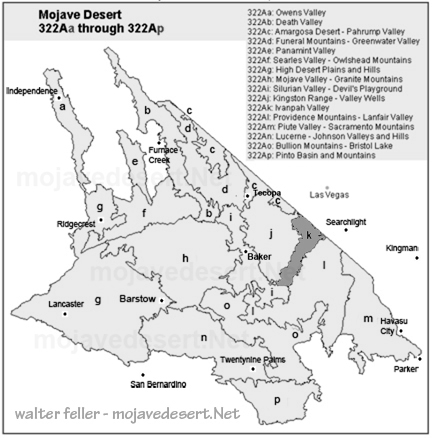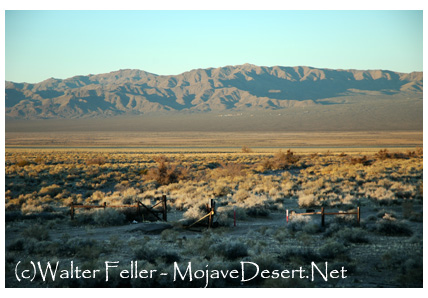Subsection 322Ak
Ivanpah Valley
This subsection is the alluvial plain of Ivanpah Valley. There are a few moderately steep hills protruding through the alluvial plain. It has a hot arid climate. MLRA 30g.
Lithology and Stratigraphy. This subsection contains mainly Quaternary fluvial, lacustrine, and eolian sand deposits. Hills protruding through the alluvial plain are mainly Precambrian metamorphic rocks.
Geomorphology. This subsection is mainly on very gently to moderately sloping alluvial fans, nearly level basin floor and dry lake bed. Ivanpah Valley is oriented toward the north-northeast. Alluvial fans slope up to about 18%, but only the upper parts of them have slopes >12 or 15%. There are large playas on the lake beds. The elevation range is about 2600 to 4500 feet. Fluvial erosion and deposition, and eolian deflation and deposition are the main geomorphic processes.
Soils. The soils are mostly Typic subgroups of Torrifluvents, Torripsamments, and Torriorthents and Calciorthids. There are shallow Typic Paleorthids on old fans. Soils on hills are mostly Lithic Torriorthents and Lithic Camborthids. The soils are well drained, except on poorly drained playas. Soil temperature regimes are thermic; and soil moisture regimes are aridic.
Vegetation. The predominant natural plant community is Creosote bush series. Joshua tree series is common on alluvial plains. Mixed saltbush series is common on basin floor and Iodine bush series and Saltgrass series are present on wet basin-fill and lacustrine deposits. Greasewood series occurs in riparian areas and around saltmarsh.
- Characteristic series by lifeform include:
Grasslands: Alkali sacaton series, Big galleta series, Desert sand - verbena series, Indian ricegrass series, Saltgrass series.
Shrublands: Brittlebrush series, Creosote bush series, Creosote bush - white bursage series, Desert-holly series, Fourwing saltbrush series, Greasewood series, Iodine bush series, Joshua tree series, Mixed saltbush series, Scadscale series, White bursage series, Winter fat series.
Forests and woodlands: Mesquite series.
Surface Water. Runoff is rapid from mountains and alluvial fans and slow from basin-fill. All drainage is internal, mostly to closed basins in Ivanpah Valley, but the southern end drains through Kelso Wash to Silurian Valley. Streams are dry most of each year. There is temporary ponding on playas, or dry lake beds.
< previous - Mojave Desert - next >
clickable map - select a section to view
